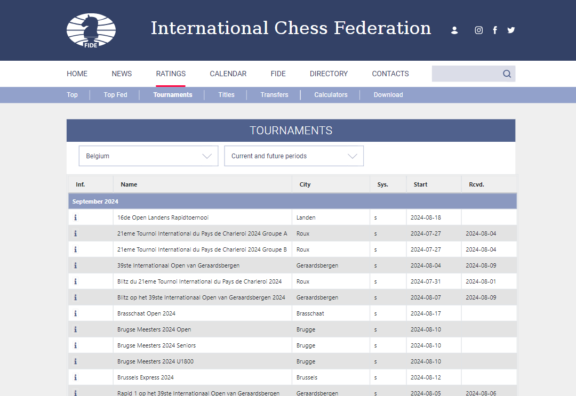Steven Bellens 24.08.2024 22
In our April survey, a majority of respondents indicated their preference of moving towards a unified global rating system (FIDE). In order to have a good understanding of both systems, we are launching this series of articles. This is the third of four articles explaining the reporting requirements for FIDE rated tournaments.
There are four main steps to be done in order to report your tournament for FIDE ELO:

Registration of tournaments is done through the RBCF FIDE delegate. In order to respect FIDE deadlines, registration needs to be done latest:
Registration of a tournament is done through the registration form availabe on the FIDE forms overview page. Fill in at least all the required fields, and send it to the RBCF: fide@frbe-kbsb-ksb.be.
The RBCF FIDE delegate will review your request, register the tournament at FIDE, and send you back one or more FIDE registration number(s). Your tournament is then visible in the list of FIDE registered tournaments.
For tournaments lasting longer than 30 days, a registration needs to be done per round and intermediate results need to be reported per round. The reporting deadlines are the same as indicated in the next section.
For these longer tournaments, only the first round will be invoiced. This means, there is no financial drawback in having multiple registration numbers.
In order to submit a homologation application, the RBCF manager must choose between three options:
Final tournament results need to be submitted for reporting at the latest 3 days after the tournament ended.
FIDE calculates for each homologated tournament (or round) the month in which the results will be processed. The rule is that if the end date of the tournament or round is until the third last day of the month, then it is month + 1. If the end date of the tournament or round falls on one of the two last days, then it is month + 2. Examples:

If a tournament ends on 30/07/2024 and the report is sent to the RBCF manager the same day and he also loads the results the same day, the results will only be processed for the FRL of 1 September.
This is not the case the other way around. If the tournament results are not uploaded by the RBCF manager three days before the end of the month, the results will only be processed in month + 2. For example, the report with the results is uploaded by the RBCF manager on 30/07/2024, then these results will only be processed for the FRL of 1 September 2024.
An invoice is send by FIDE to the RBCF twice a year, in January and July. The RBCF sends through indivual invoices to the tournament organizers, with the costs for the tournament reporting. All costs charged by FIDE for rating reporting are invoiced to the tournament organizers. The RBCF does not add any markup to these invoices.
Visibility, controllability and discipline.
Visibility, because players can consult the FIDE rated tournaments list for an overview of tournaments that will be rated.
Controllability, because both RBCF and FIDE can verify whether tournament results are reported as expected.
Discipline, in order to avoid late submissions.
The benefits of tournament registration far outweight the additional effort. As such, the RBCF is also preparing pre-registration for national ELO processing. Regardless of the fact that we’ll migrate our ranking system to FIDE only, pre-registration will become a requirement in the future. We plan a transition period for all organizer to adapt to this new way of working.
FIDE ELO reporting is natively integrated in the SWAR pairing software. Consult the SWAR manual for more details.

All players need to have a FIDE ID in order for the tournament results to be processed.
The clubs must send the RBCF manager no later than three days after the end of the tournament (and in the case of a norm by a player also the pgn file). If a report is uploaded too late by the RBCF manager, a fine will be imposed. This fine will increase each month that the reports are not processed.
If after three months in which the report could have been processed, the results have not yet been received, the tournament can no longer be processed and a fine will follow. FIDE invoices the fine to the RBCF, but the RBCF simply invoices this fine to the club / league / federation of the organizer.
For the sake of clarity, let’s give an example. Suppose a tournament ends on 27/07/2024. The calculated FRL will be 1 August 2024. However, a club can send its report without a fine until 30/07/2024. If it does so on that day, the games will not be processed for the FRL of 1 August 2024, but they will be for the FRL of 1 September 2024. FIDE will NOT impose a fine because all deadlines were respected.
When a Belgian player obtains a norm, he should receive a signed document from the chief arbiter. In the best case it should already been signed by the organizing federation. He must without delay scan this document and send it to the Belgian FIDE Delegate. Additionally, he must send the link of the tournament website of the result and also a pgn-file containing the relevant games:
Finally, if there is not a recent players photo on the FIDE ratings website, the player must send a recent photo with the exact measures of 480 pixels wide and 600 pixels high.
If an error is found in a reported (round of a) Belgian tournament, then the organizer/chief arbiter must (i) inform the Belgian FIDE Delegate and (ii) share the corrected report.
There are two possibilities, depending on whether the error was discovered within the same month that the tournament must be reported:
The FIDE Rating Regulations are the official FIDE source of information. For all questions or feedback, please reach out through fide@frbe-kbsb-ksb.be.

Steven Bellens 13.09.2024
In our April survey, a majority of respondents indicated their preference of moving towards a unified global rating system (FIDE). In order to have a good understanding of both systems, we are launching this series of articles. This is the last of four articles explaining the arbiter requirements.
Read more
Steven Bellens 12.08.2024 12
In our April survey, a majority of respondents indicated their preference of moving towards a unified global rating system (FIDE). This is the second of four articles explaining the FIDE ELO cost structure.
Read more
Steven Bellens 30.07.2024
In our April survey, a majority of respondents indicated their preference of moving towards a unified global rating system (FIDE). In order to have a good understanding of both systems, we are launching this series of articles. This is the first of four articles explaining the differences between FIDE ELO and national ELO.
Read more
This page explains the differences between the international FIDE rating system and our own national ELO calculation system. It also looks at our neighbouring countries, and summarizing information about their systems and way of working.
Read more
Stefan Timmermans
24.08.2024 - 16:15Deze vormvereisten zijn de definitieve doodsteek voor alle tot hiertoe nog verwerkte clubkampioenschappen. Je moet u de impakt inbeelden dat in het kleine clubslandschap van Belgie nu nagenoeg 95% van het club landschap nu geen eigen clubkompetitie kan aanbieden met elo verwerking. Voornamelijk jonge leden betalen lidgeld om naast hun online rating een idee te hebben van hun over the board rating. Maar de club kan daar in hoofde van zijn eigen organisatie niet meer aan voldoen ? Jonge online spelers, spelen nu al met inzet, en de club kan dit niet aanbieden. Als je dan individueel ook nog eens moet betalen om aan tornooien mee te doen, krijg je het euvel dat clubs leden hebben die niet meer naar de clubavond komen maar om een stamnummer te hebben. De afschaffinf vd nationale eloverwerking is in deze een slag in het gezicht van de overlevingskansen van de kleinere klubs.
Steven Bellens
25.08.2024 - 11:50Hey Stefan,
het is zeker en vast de bedoeling om de clubkampioenschappen nog steeds te verwerken, en dit met minimale extra administratieve overlast voor de organisatie. Ik lees twee bezwaren in uw feedback:
Stefan Timmermans
25.08.2024 - 21:01Hoe anderen het doen, kan ik me niet overuitspreken. Ik stuurde alles netjes door voor de vooropgestelde deadlines en bevestig dat je met de elos vh moment werkt en niet die van maanden later.
Ik vind de meldingsplicht na elke ronde erovef everwel, gezien de driemaandelijkse verwerking.
Het is ook niet persoonlijk naar u in uw rol, want je hebt de zaak grondig bestudeerd en bent open geweest in uw communicatie.
Alleen deel ik ook de vooringenomenheid van de enquete epiloog dat we naar een uniform systewm moeten en dat we vooral kampten met problemen van onderhoud van tools om de elo verwerking te toen en een persoon die dit nog op zich wil nemen.
Anderzijds en ook in het fide verhaal is het nog altijd aan de kbsb om in eerste instantie de resultaten over te maken aan de fide.
Heeft de fide dan zelf geen equivalent voor “swar/pairtwo” ? Of moeten we daar dan ook voor betalen ?
Ik lees hieronder dat iemand ook aanhaalt dat we indien we met de kennis die we nu hebben , anders hadden gestemd. Anderzijds is 90% van de schakers hier niet mee bezig. Het is een beetje gelijk stemmen voor de politiek. De meeste mensen stemmen zonder kennis van zaken en zodoende worden dd mensen die kritisch staan tegenover dit alles overwoekerd door het stemgedrsg van mensen die het niets kan schelen.
Steven Bellens
25.08.2024 - 21:43Ik ga niemand consequenties opdringen nav de antwoorden in de enquête Stefan. De enquête is indicatief. Op de Algemene Vergadering in november zal aan _alle_ leden – ook zij die de enquête niet invulden – het voorstel gedaan worden om te migreren naar FIDE ELO ja of nee. Indien er een ‘nee’ komt zal ik die beslissing evenzeer respecteren.
Cijfermatig zie ik nu reeds heel wat clubs die spontaan hun toernooi(en) voor FIDE registreren. Ik moedig alle schakers aan om een keer met mekaar van gedachten te wisselen hieromtrent. Hoe ervaren die clubs de FIDE ELO rapportage?
Idem ivm het gebruik van SWAR. 90% van de rapportage van nationale ELO gebeurt momenteel via SWAR. Ervaren clubs dat programma als ingewikkeld? Indien dat zo is hoor ik dat graag. Maar eerlijk gezegd is dat niet de feedback die momenteel tot bij mij komt.
Dan zwijgen we nog over de groep van schakers die bewust enkel deelneemt aan toernooien die voor FIDE ELO meetellen. Waarom maken zij bewust die keuze?
Over de administratie gaan wij het vermoedelijk niet eens geraken. Als ELO verantwoordelijke zie ik nu twee systemen die qua klassering zeer gelijkaardig zijn en qua administratie heel wat gelijkenissen vertonen. Ik erken het probleem van gebrek aan arbiters en sta open voor oplossingen.
Gelet op het vrijwilligerswerk dat in de nationale ELO kruipt, is dit zeker ook een kans om tijd vrij te maken. Extra tijd voor initiatieven vanuit het bestuur die meer brengen voor het schaken dan gewoon een duplicaat klasseringssysteem.
Christiaan Vanroose
25.08.2024 - 00:44Dat alle voorstanders voor de afschaffing van de nationale ELO rating bovenstaande eens goed lezen.
Kunnen we de enquete voor al dan niet afschaffen van de nationale rating dan misschien eens herhalen mét kennis van zaken ? Ik denk dat veel van mening zullen veranderen. Hier alvast geen voorstander van afschaffing van de nationale ELO rating !
Stefan Timmermans
25.08.2024 - 21:15Dat zie ik ook zo. Ik wist wel +- 80% van wat Steven opwerpt maar de problemen om exclusief voor fide te gaan zijn nog erger dan gedacht.
De overmatige administratie , en de verplichte gecertificeerde fide arbiter staan in de weg. Toch is de relatieve eenvoud van nu een + om het schaakleven op clubniveau niet overmatig ingewikkeld te maken. Ik denk dan ook aan onze nationale wedstrijdleiders die een waardeloze nationae arbiter titel hebben , examens en stages moet door lopen, hun dossier voor commissie moeten laten komen en voor dit alles langs de fide kassa moeten passeren. Ik vraag me echt af wie de draad nog gaat opnemen om aan de criteria te voldoen om dat nog maar te worden. Als we te weinig fide arbiters hebben, zijn zij die het zijn overbelast en leidt de ganse schaaksport in Belgie eronder.
Ik denk dat ze er bij de bond niet bij stilstaan dat de meeste kleine clubs met het programma swar , om de uitslagen te submitten, niet aan de slag kunnen. Het is erg als er beslissingen vanboven worden genomen en de basis niet mee is. En met name de fide is een organisatie die veel hervormt in korte tijd. Denke aan de klokken, de speeltempos , eloaanpassing en eloverwerking.
Gert Van Bunderen
26.08.2024 - 01:42Beste Stefan ik ben het in deze volledig met je eens. Ik vind (ik spreek dan in eigen naam) het contraproductief om de nationale Elo af te schaffen en te vervangen door de FIDE Elo en ook onnodig. Op clubniveau wordt administratieve last van het beperkt aantal mensen in een bestuur steeds zwaarder en dit zou er dan nog bijkomen. Door de striktere vereisten rond rapportering heb je als club ook minder flexibiliteit rond het organiseren van een clubkampioenschap of een ELO-tornooi. Zelf heb ik regelmatig met SWAR gewerkt maar vind dit allesbehalve gebruiksvriendelijk (in vergelijken met het vroeger PairTwo en Swiss Manager). Daarnaast is SWAR dacht ik nog niet goedgekeurd door de FIDE (zie endorsed FIDE programs). Er is ook geen enkele garantie dat FIDE zijn prijzen (nu ongeveer 1 euro per deelnemer) niet plots gaat verhogen.
Ronny Liekens
30.08.2024 - 15:04Ik zie ook nog een ander probleem met verwerking van interne clubkampioenschappen, namelijk dat er soms uitgestelde partijen zijn en die dan op een later tijdstip worden gespeeld, dit later tijdstip kan 1 of 2 maanden later zijn omdat de meeste mensen hun partijen alleen op de clubavond spelen en de reguriel geplande partijen voorrang hebben op de uitgestelde Als je dan verplicht word maandelijks reportage te doen, word dit onmogelijk om je dan niet een volledige ronde kan doorgeven zoals vereist Ben dan ook voorstander om de nationale elo te behouden
Steven Bellens
01.09.2024 - 08:01Hey Ronny,
uitgestelde partijen zijn een aandachtspunt. Zeker in het geval van clubkampioenschappen die vele maanden kunnen duren, en waar je de leden graag de tijd geeft om hun (uitgestelde) partij te spelen wanneer het past.
Ik heb deze situatie reeds met FIDE besproken, en zij zien dit ook terugkomen in andere landen? Welke ‘oplossing’ is er daarvoor?
De (gedeeltelijke) resultaten van een ronde doorgeven op het voorziene tijdstip, en de uitgestelde partijen later rapporteren in een apart ronde-verslag. Dat kan ook op het einde van het toernooi. Waar dat zeker leidt tot wat extra administratie, zijn de voordelen van deze aanpak voor mij duidelijk:
– partijen worden meteen gerapporteerd, wat een betere ELO verwerking verzekert
– de extra partijen kunnen nog steeds gespeeld worden op het tempo van de speler / club
– er is geen financiële impact
Stefan Timmermans
31.08.2024 - 22:17Idd, de uitgestelde partijen en doorsturen van deelse resultaten en de problemen erna om die uitgestelde partijen wel te verwerken., het risiko om zelf het overzicht te verliezen en uitslagen dubbel door te geven in de tijd. Allemaal zaken die niet zo eenvoudig zijn met dat ding. Hoe los je dat op ? En dat zijn de problemen waar de clubs dan mee zitten.
Hoe meer tussentijdse rapportering , en bij de fide is dat maandelijks, hoe meer werk voor prularia om nog maar 1 ronde te verwerken.
Voorwaar dat gaat nooit lukken.
Er zijn te weinig mensen die met die tools mee zijn. En idd pairtwo was light. Gebruikers en formule invoeren en je had een paring. Uitslagen invullen en weg was je.
Steven Bellens
01.09.2024 - 08:05Hey Stefan,
Wanneer we kijken in de ons omringende landen, dan zien we dat er een heel aantal landen reeds enkel FIDE ELO rapportage gebruiken: Frankrijk, Spanje, Portugal, Zweden, Noorwegen. Als zij het kunnen, ben ik er van overtuigd dat het ons ook kan lukken :).
Als we dan kijken naar de landen die nog wel een eigen ELO systeem hebben, dan zien we daar ook vaak onderzoek waarom dat nog nodig is. Ik heb hierover reeds geschreven hier: https://blog.frbe-kbsb-ksb.be/comparing-fide-elo-vs-national-elo/
PS: Bernard Malfliet heeft gewerkt op een nieuwe versie van PairTwo. Je kan em hier downloaden: https://blog.frbe-kbsb-ksb.be/software/
Ronny Liekens
03.09.2024 - 12:17Kom je dan niet in conflict net de regel dat je de voledige ronde gelijktijdig moet doorgeven Swar laat dit zelf niet toe om onvolledige rondes door te geven (of je moet de uitslagen van de uitgestelde partijen als 0-0 doorgeven) ? Of word deze manier van rapporteren toegelaten door de FIDE ( tijdelijk 0-0 doorgeven) Oftewel zou het handig zijn als SWAR het toelaat om onvolledige rondes door te sturen
Steven Bellens
03.09.2024 - 17:55Klopt, en daar dienen we dan ook een mouw aan te passen! Dit is een aanpassing die dan in SWAR dient te gebeuren. Idealiter passen we aan zodat het voor de gebruiker zo eenvoudig mogelijk is om die utigestelde partijen op het einde apart door te geven.
stefan timmermans
05.09.2024 - 00:11Die problemen had ik ook voor.
In het clubkampioenschap is het idd mogelijk partijen uit te stellen. Sommigen liepen zelfs 2 tot 3 rondes achter.
Dus ik hield zelfs in Pairtwo een bestand bij waarin in alles stond kwestie van de paringen ter onzer behoefte , maar had evengoed ook deelbestanden waarin ik reeds verstuurde uitslagen nullifieerde en alleen die uitslagen weerhield die na de vorige verwerking werden gespeeld. . Dat deed ik zo voor de 3 eloverwerkingen. Dus ik had 3 databankbestanden zo u wil. En ook daar waren onvolledige uitslagen bij en moest ik dat zelf erg minutieus bijhouden.
Niemand leert u hoe die tools te gebruiken en hoe je praktische situaties zoals dit dient op te lossen.
Dat zoiets bij de fide niet meer door de beugel kan, kan ik me goed inbeelden. Het is op alle mogelijke manieren die voorhanden zijn foefelen tot het verwerkt wordt. Voorwaar wie gaat zo een gepuzzelbvoor zijn rekening nemen.
Wij hadden trouwens een visueel beperkt lid die we om financiele beperkingen lieten deelnemen aan ons kampioenschap zonder dat hij de kbsb/fide bijdrage moest betalen.
teneinde ook voor hem een betaalbaar lidmaatschap aan te bieden. Je kan het een sociaal tarief noemen voor mensen met een beperking.
Die moest ik eruit filteren , ook door nullificatie van zijn uitslagen Dat ging, voor de kbsb maar ook dat zou nu niet meer kunnen voor de fide.
Bernard Malfliet
06.09.2024 - 11:30Ik ga kijken hoe ik zo snel mogelijk een functie kan toevoegen dat je ten allen tijde resultaten kan opsturen, en waarbij het belangrijk is dat je het(de) verstuurde bestand(en) op je schijf bewaard houdt, zodat Pairtwo kan controleren wat al verstuurd is en de volgende keer enkel de update verstuurt. Dat kan hopelijk voor einde september klaar zijn.
Stefan Timmermans
06.09.2024 - 18:38Dat verwelkomen wij Bernard !
Bernard Malfliet
14.09.2024 - 20:40Bij deze kan ik melden dat Pairtwo 1.16 nu onvolledige toernooien kan verzenden voor KBSB ELO. Dus het is niet langer nodig om bij te houden wat je wel of niet verstuurd hebt, Pairtwo doet dit voor jou, stuurt wanneer je wil en zorgt ervoor dat daarna enkel de nog niet eerder verstuurde resultaten verzonden worden, het is ook niet nodig om te wachten tot een ronde kompleet is om ze te versturen. Hopelijk helpt dit bij de administratie van vele klubkampioenschappen.
Nicolas Rauta
11.09.2024 - 23:55Cet article, comme les précédents, reprend les obligations de la FIDE mais nous ne savons toujours pas si celles-ci seront imposées par la FRBE.
Notre club vient de reprendre ce soir, 2 joueurs franchissant pour la première fois la porte d’un club et 3 joueurs qui ne sont plus ou pas encore réaffiliés, certains faisant partie d’autres cercles que le nôtre.
Que devrons-nous leur dire dans le futur?
Désolé mais les instances nous interdisent de vous laisser tester les échecs en présentiel?
Désolé mais tant que tu n’es pas réaffilié, nous refusons que tu joues une partie dans le club?
N’y a-t-il pas une différence entre les tournois internationaux comme le TIPC, le championnat de Belgique, … et les tournois de clubs?
L’objectif n’est-il pas différent?
Le pire dans cette histoire est qu’une fois un Elo FIDE obtenu, il n’est plus du tout nécessaire de s’affilier pour pouvoir jouer des tournois FIDE à part quelques exceptions comme les interclubs et le championnat de Belgique (encore qu’il y a des exemples sur certains championnats de Belgique de parties rapides où le joueur n’était plus affilié nulle part).
Le joueur est de toute façon repris automatiquement sur les listes de la FIDE avec un numéro de matricule FIDE tant que la fédération ne le supprime pas.
La FIDE n’est pas bête, un joueur qui reste dans sa liste est de l’argent qui rentre.
Steven Bellens
12.09.2024 - 20:56[quote]Que devrons-nous leur dire dans le futur?[/quote]
c’est la même chose que ce que tu leur dis maintenant ? Souhaitez-vous une méthode pour exclure les joueurs non affiliés du rapport FIDE ? Ou est-ce que je comprends mal cette question ?
[quote]N’y a-t-il pas une différence entre les tournois internationaux comme le TIPC, le championnat de Belgique, … et les tournois de clubs?[/quote]
Je pense que oui. En ce qui me concerne, nous respectons strictement l’affiliation à la FIDE dans les tournois « majeurs », et nous accordons toujours aux clubs, en interne, la possibilité d’autoriser les joueurs non affiliés à jouer dans les championnats de club.
[quote]Le joueur est de toute façon repris automatiquement sur les listes de la FIDE avec un numéro de matricule FIDE tant que la fédération ne le supprime pas.[/quote]
il me semble qu’elle n’a que des avantages. Ou est-ce que je vois mal ?
Nicolas Rauta
15.09.2024 - 21:57Aujourd’hui, je leur dis qu’ils peuvent jouer, essayer les échecs en présentiel et s’ils accrochent, ils peuvent ensuite s’inscrire à la fédération. Personnellement, j’estime que cela fait partie de la promotion du jeu. Swar me permet de les retirer avant l’envoi des résutlats à l’Elo belge.
En théorie, si tous les tournois deviennent Fide, cette option ne peut plus exister. C’est exactement ce que dit cet article.La Fide peut aussi annuler tous les résultats du tournoi s’il y a eu une manipulation manuelle (suppression d’une partie, changement d’un appariement à la main, …).
Je demande donc qu’elle sera l’approche à prendre si la fédération décide de ne garder que l’Elo FIDE et va-t-elle appliquer de manière stricte le texte de ce blog? Que devons-nous dire à un joueur qui vient pour la première fois et veut essayer?
Quant à mon dernier point, Steven, je voulais juste souligner que les joueurs n’auront plus aucune raison de s’affilier à la FRBE, sauf exception pour quelques tournois, vu qu’ils restent toujours dans les listes de la FIDE. C’est déjà le cas aujourd’hui avec les joueurs ayant un FIDE à l’étranger et participant en Belgique.
Steven Bellens
16.09.2024 - 08:42Bonjour Nicolas,
[quote]Aujourd’hui, je leur dis qu’ils peuvent jouer, essayer les échecs en présentiel et s’ils accrochent, ils peuvent ensuite s’inscrire à la fédération. Personnellement, j’estime que cela fait partie de la promotion du jeu.[/quote]
Je suis entièrement d’accord avec cela et pour moi, une alternative devrait être développée dans le cadre de la migration. Il faut pouvoir maintenir ce principe, c’est-à-dire que les joueurs doivent pouvoir faire connaissance sans encourir immédiatement de frais ou d’administration.
Je comprends que votre dernier point est plus large: qu’est-ce que j’obtiens en étant membre de la FRBE?
Si l’on ne regarde qu’ELO, il reste une tâche importante pour la FRBE : formation des arbitres, administration & reporting FIDE (Il n’est pas possible d’envoyer des rapports directement à la FIDE en tant qu’organisateur).
On peut aussi approfondir les autres facettes, mais il me semble préférable d’assister à l’assemblée générale par exemple pour mieux comprendre toutes les activités de la FRBE.
Nicolas Rauta
16.09.2024 - 09:41Steven, pour le dernier point, ce n’est pas à moi que vous devez l’expliquer mais aux joueurs de club.
La plupart des joueurs associent simplement la FRBE au fait d’obtenir un classement, surtout ceux qui ne fréquentent que leur club local.